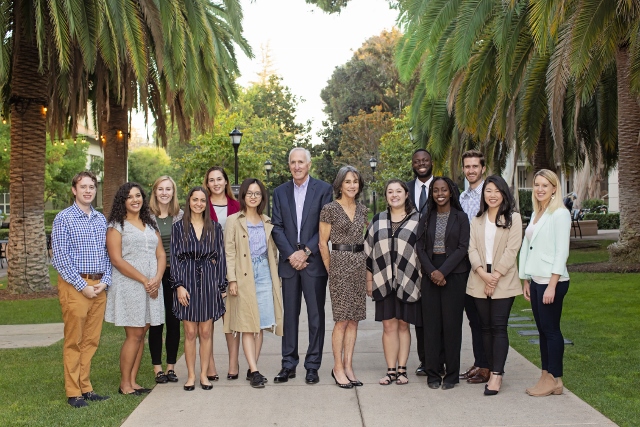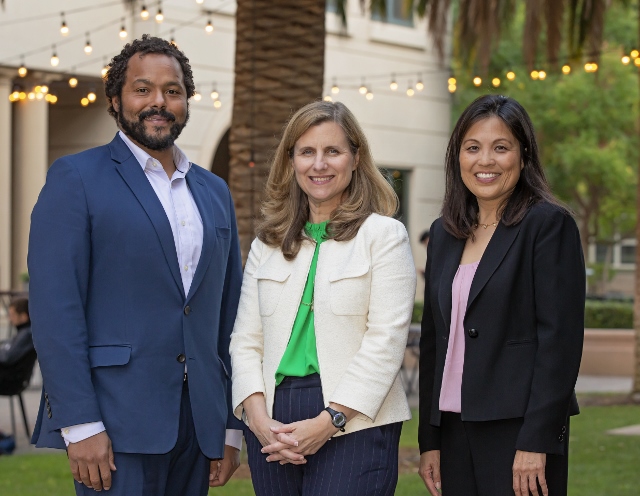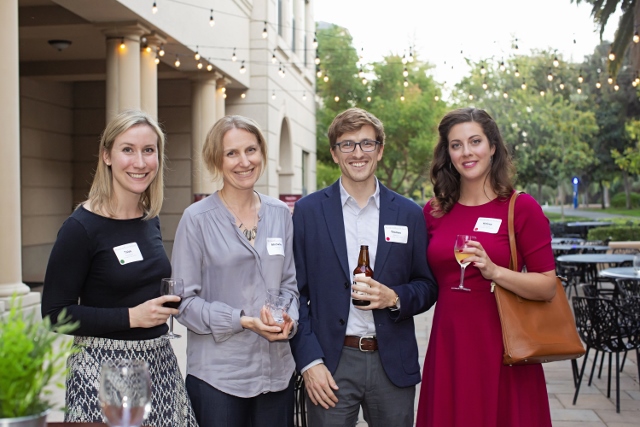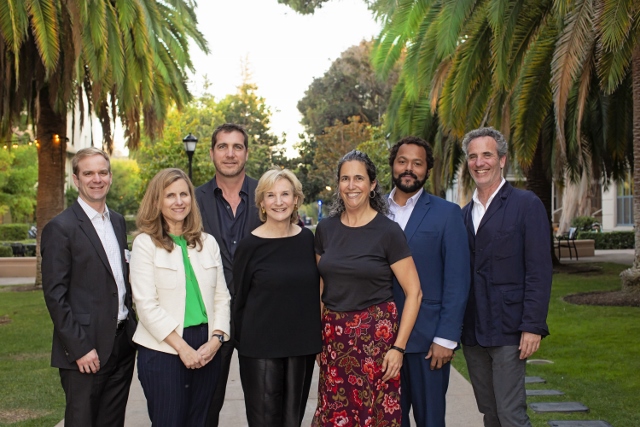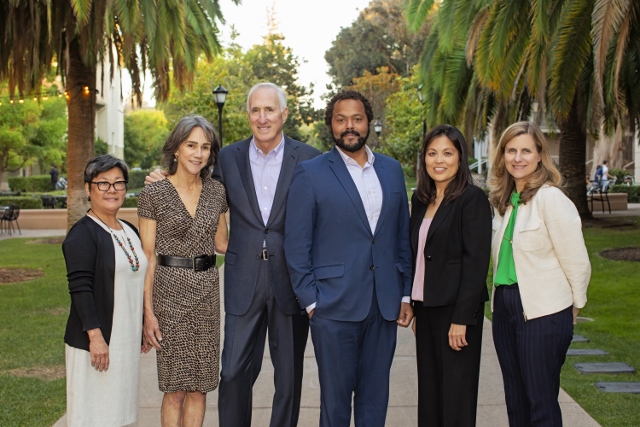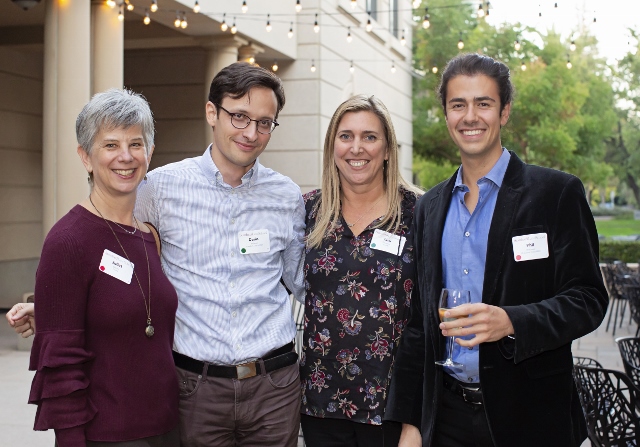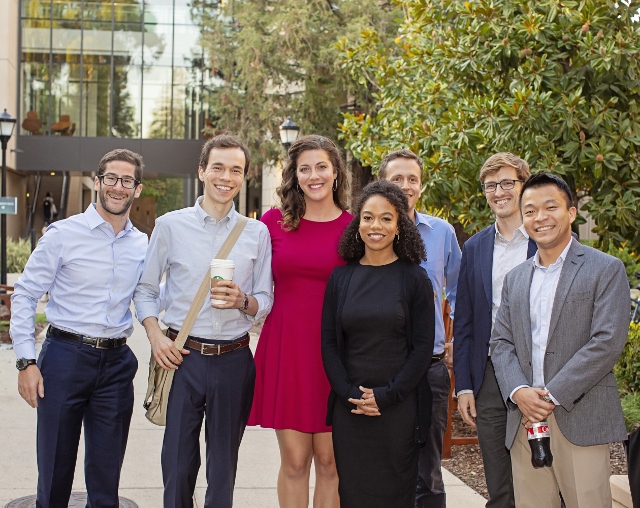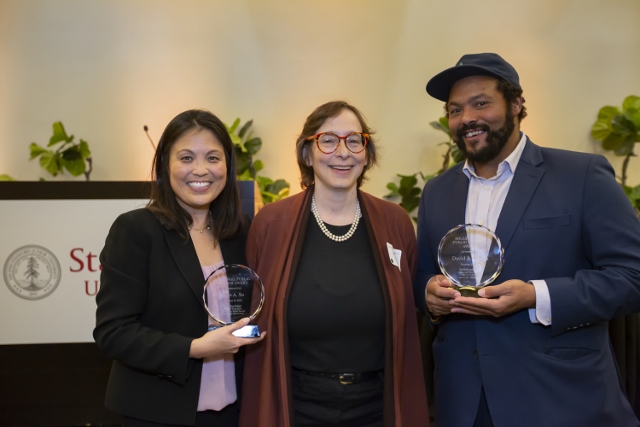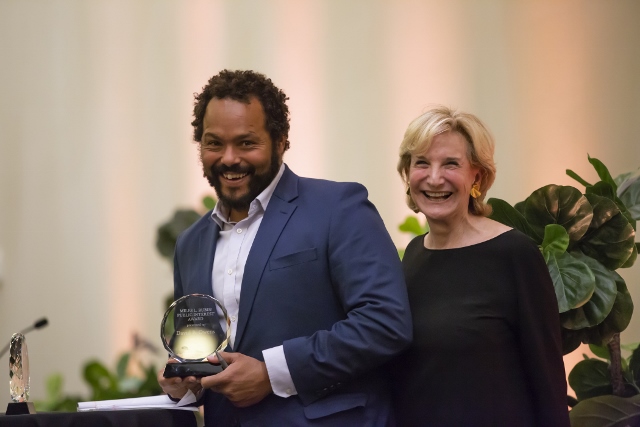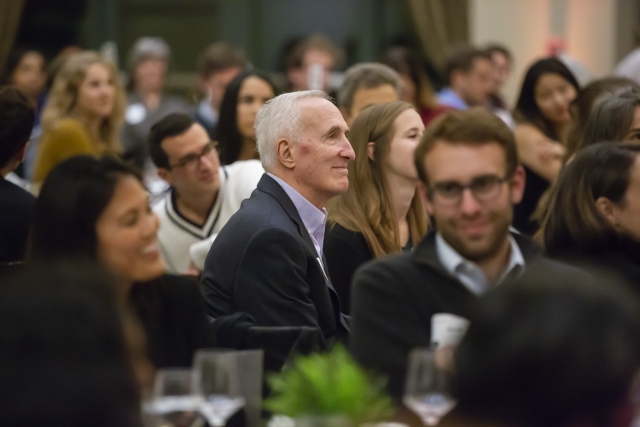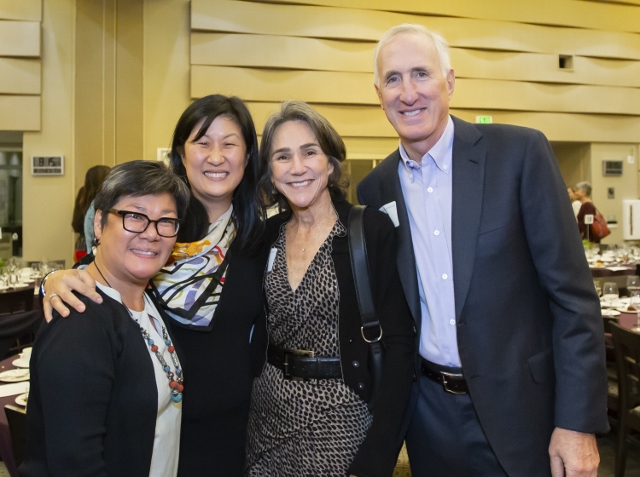Executive Director's message
Be the change you wish to see in the world . . . – Gandhi
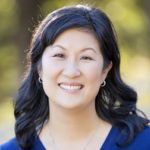
Happy New Year! With the new year comes a new look for our newsletter. We have switched to this format to offer a more accessible platform for those using screen readers or mobile phones. It also enables us to have more flexibility since there aren’t space constraints.
In this issue, you can view photos from our Fall Public Service Awards dinner; read a profile on the Miles L. Rubin Public Interest Award recipient, David Owens, JD/MA ’10; learn about our new speaker series, “Inspiring Voices of Social Justice,” which will be launched this quarter with a visit by the Honorable Carlton Reeves of the U.S. District Court for the Southern District of Mississippi; get an update on Pro Bono service at SLS; read about our Spring quarter Global Practitioner-in-Residence, Mbekezeli Benjamin, a staff attorney at Equal Education Law Centre; and see a reminder about the deadline for the SLS Postgraduate Public Interest Fellowships.
I hope you enjoy reading about what has happened on campus this past quarter as well as what is anticipated to come this upcoming quarter. As always, I welcome your feedback.
Sincerely,
Anna
Alumnus Champions Justice for Wrongfully Convicted and Victims of Civil Rights Violations
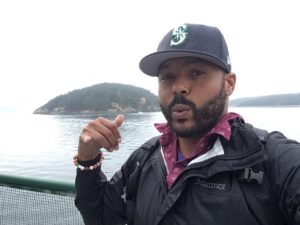
David B. Owens, JD/MA ’10, was recently honored as our 2018 Miles L. Rubin Public Interest Award recipient. The Miles L. Rubin Public Interest Award recognizes an alumnus/a whose outstanding work has advanced justice and social change in the lives of vulnerable populations on a community, national, or international level. In particular, the Rubin Award is intended to highlight concrete and sustainable approaches and solutions to a societal problem.
Owens is a partner at Loevy and Loevy in Chicago, which he joined in 2012 after clerking for the Honorable Diane P. Wood of the United States Court of Appeals for the Seventh Circuit and the Honorable Myron H. Thompson of the United States District Court for the Middle District of Alabama in Montgomery, Alabama. His practice is national, representing clients from Washington and California, in Wisconsin and Illinois, and throughout the South.
Owens focuses on cases involving wrongful convictions, police shootings and other excessive force, false arrests, free speech rights, race discrimination, and other violations of the U.S. Constitution. Over the course of his career, Owens has helped many clients secure large settlements and win jury verdicts. When asked to share one of his most meaningful cases, he states, “It is difficult to identify what work-related accomplishments are most meaningful or how to even define what that means. Some of the most memorable moments of my career come from difficult moments; from failing to persuade a Court to free my wrongfully convicted client or spending time, in others, being with families of victims of police shootings as they grieve the sudden (and unjustified) loss of a loved one.”
Yet he adds, “That said, putting aside any sort of monetary verdicts or settlements, the most impactful accomplishments to date are probably those that involve moments where litigation has led to policy change. In a police shooting case on behalf of Tony Robinson, Jr., in Madison Wisconsin, for example, the most impactful moment was not settling the case for a record amount on the eve of trial but the fact that our work, and a press conference after the settlement about the systemic failures in the investigation, led not just the City of Madison to change its standard operating procedures but also led the Wisconsin Department of Justice to alter the way in which they investigate officers who use deadly force. Likewise, last year, during the course of trial, I settled a race-discrimination suit brought in Gulfport, Mississippi, that involved segregation-era style discrimination in the way the publically elected Coroner handled mortuary services. The Coroner at trial literally defended his actions by saying that ‘historically, white bodies go to white funeral homes and black bodies go to black funeral homes’ as reason why he was justified in directing over 90% of the County’s business to the white-owned firms. The settlement included implementing a formal rotation system among all firms; i.e., formally desegregating the manner in which public funds are used in mortuary services the county.”
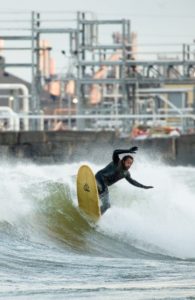
Owens is a native of Seattle and earned his undergraduate degree from the University of Washington. Owens explains why he chose to pursue a law degree. “For better or for worse, I basically always knew I wanted to be an attorney. Law is power. And, after experiencing personal injustice and discrimination growing up, I wanted to take the power back. I also wanted to be able to serve as an advocate for others who, like me, needed someone with the ability to speak the language of law to assist them rectify or prevent injustice. It seems laughable now, but growing up, I remember telling people in high school, I wanted to be the president or a Supreme Court justice one day… By the time I got to law school, though, and after a stint teaching 6th Grade in Los Angeles, the focus of getting a J.D. was, and remains, seeking social, environmental, racial, and economic justice.”
He shares, “Coming to SLS, once admitted, was a no-brainer. I liked the small size, was excited about the clinical offerings, and valued the fact that SLS makes efforts to admit students from big state schools, like the University of Washington where I went for undergrad. In addition to being the best law school in the country, it’s also next to the Pacific Ocean! That means surf’s up! Some of my favorite, favorite memories from law school involved taking others surfing. My 2L year, for example, the [Black Law Students Association] retreat featured about 10 or 12 of us in Santa Cruz hitting the waves. In my final year, as part of the [Stanford Public Interest Law Foundation] auction, David Edeli, JD ’11, and I offered surfing lessons, which were ‘won’ by our mentors—[Professors] Pam Karlan and Juliet Brodie. Taking our mentors, with their partners and children, surfing is a day I’ll never forget!”
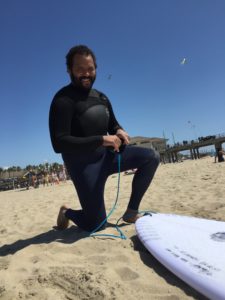
Owens earned both his J.D. and an M.A. in Philosophy from Stanford University in 2010. At Stanford Law, he was the Senior Articles Editor of the Stanford Law Review, a Member Editor of the Stanford Environmental Law Journal, received the Gerald Gunther Prize for Outstanding Performance in Federal Courts, earned Pro Bono distinction, and served as a fellow in the Levin Center for Public Interest. He was also a member of the Stanford Supreme Court Litigation Clinic, where he worked on numerous cases at the United States Supreme Court, most notably representing a number of civil rights groups in banking regulation litigation and successfully representing an indigent criminal defendant in Flores-Figueroa v. United States, 556 U.S. 646 (2009), which avoided harsh application of a mandatory-minimum sentencing statute. During law school, Owens also worked for the ACLU of Washington Foundation; a nonprofit in Lagos, Nigeria [trying to] institute Miranda-derived protections against coerced confessions; and a boutique firm in San Francisco specializing in environmental protection issues.
He concludes with his advice for current law students. “Go to office hours! And, maintain perspective. As stressful as anything ever feels in law school remember that SLS is really just preparing you, in a pretty great environment, to face the real world and put your skills to the test. So, while there may be ups and downs along the way, don’t let the academic stress be overwhelming. Don’t forget to do whatever it is that you like to do—whether it be surfing, yoga, gardening, spending time with friends/family, etc.—that makes you happy.”
2018 Fall Public Service Awards Dinner Photo Gallery
Inspiring Voices of Social Justice: A Quarterly Series of Diverse Stories in Public Interest Practice
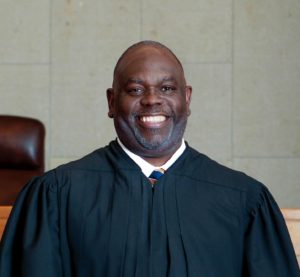
The Levin Center is launching a new speaker series, Inspiring Voices of Social Justice: A Quarterly Series of Diverse Stories in Public Interest Practice near the end of January. Our first speaker will be the Honorable Carlton Reeves of the U.S. District Court for the Southern District of Mississippi. Judge Reeves will be holding office hours to meet one-on-one with students, speaking on federal criminal sentencing at an event co-sponsored with the Stanford Criminal Justice Center, and giving an address about the importance of diversity in the legal profession. More details about specific events will be sent to students via e-mail.
Our goal with the Inspiring Voices of Social Justice: A Quarterly Series of Diverse Stories in Public Interest Practice program is to showcase diverse members of the legal profession who can inspire a next generation of lawyers to engage in public service through their careers. We have heard from our students of color, LGBTQIA, and other under-represented students that the models presented to them for success are overwhelmingly from the private corporate sector. They want additional role models. We have also frequently had to combat the stereotype that public interest and public service practice can only be pursued by those with means and privileged backgrounds. Additionally, we know that within the public interest field, there is a dearth of lawyers from under-represented communities who are in the pipeline for leadership positions. With this quarterly series, we will highlight the experiences of practitioners, judges, and others, whose careers contest the stereotypical image of who engages in public interest practice.
When Judge Reeves was appointed to the bench in 2010, he became the second African-American appointed as federal judge in Mississippi. Since his appointment, Judge Reeves has received national attention for his rulings in Campaign for Southern Equality v. Bryant (ruling that Mississippi’s same-sex marriage ban violated the Due Process and Equal Protection Clauses of the Fourteenth Amendments), United States v. Butler (where his speech garnered millions of views after sentencing three young white men for their roles in the race-motivated attack which killed a 48-year-old black man named James Craig Anderson), Barber v. Bryant (preventing Mississippi’s Religious Liberty Accommodations Act from going into effect), and Jackson v. Currier (striking down a Mississippi law, passed in March 2018, that outlawed most abortions after the 15th week of pregnancy).
Judge Reeves is a first-generation college and law school student. He served as Chief of the Civil Division for the Office of the United States Attorney for the Southern District of Mississippi and founded his own firm before ascending to the bench. During his time in private practice, Judge Reeves served on the boards of a number of civic organizations, including the ACLU of Mississippi, the Mississippi Center for Justice, and the Magnolia Bar Association.
Judge Reeves was also profiled in our Beyond the Big Firm: Lawyers who Want Something More book, edited by Associate Dean Diane Chin and Alan Morrison (then a visiting lecturer at Stanford Law School and now the Lerner Family Associate Dean for Public Interest & Public Service at George Washington University School of Law). Profiles were all written by Stanford Law School students. In 2007, Stanford students interviewed lawyers across the country, in small and large organizational settings, who engaged in advocacy and used strategies inside and outside the courtroom, and who attended law schools of every different size and shape.
Pro Bono Service at SLS
This fall, over 80% of the incoming JD class joined Pro Bono Projects, showcasing the Class of 2021’s deep commitment to public service and public interest. Students had the opportunity to apply for participation in the 17 student-led Pro Bono Projects, all of which provide students with an opportunity to engage in meaningful, law-related work during their first year aimed at serving communities in need and public interest causes.
This year’s collection of Pro Bono Projects included two newcomers. The Community Health Advocacy Project, or CHAP, was created by several 1Ls last year to address disparities in health and health access caused by legal issues. And, the Election Law Project was created by a group of students aiming to get students involved in work that ensures people have fair access to voting.
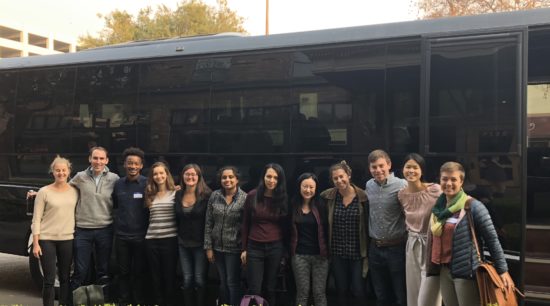
On November 10, we had our first of four Justice Bus trips for this academic year. Twelve students traveled to Fresno, California, to assist 19 clients with record clearances. Students were supervised by attorneys from the Fresno Public Defender’s office, Central California Legal Services, and Root and Rebound.
Last year’s graduating class provided more than 24,000 hours of pro bono service to communities in need and other public interest causes, representing a huge increase from prior graduating classes. The number of Class of 2021 participants in the program seems to suggest, however, that the Class of 2018’s record pro bono levels are already at risk.
Global Practitioner-in-Residence Will Arrive Spring Quarter
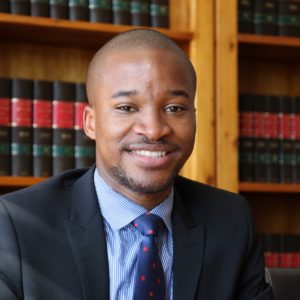
For the spring quarter, we will be hosting Mbekezeli Benjamin, a staff attorney at Equal Education Law Centre (EELC). Based in Capetown South Africa, Equal Education is a social movement of high school students, parents and ordinary community members that was formed to challenge the education inequalities which are the legacy of apartheid in South Africa. EELC was born from this movement, and uses creative legal tools to support the work of Equal Education.
Benjamin has been identified by EELC’s board and Executive Director as an emerging leader. He is originally from the Soweto township and has litigated a wide range of cases addressing the right to housing, the right to protest and the right to a livelihood that have come before South African courts at all levels from the Magistrate’s Court up to the Constitutional Court. Coming from a township school himself, Benjamin has a passion for addressing the education problems in marginalized communities. While he is at Stanford, he will be developing his leadership skills and connecting with organizations in the Bay Area that also combine legal and community organizing strategies in order to advance social justice.
Benjamin’s visit will deepen a multi-year collaboration between the Levin Center and EELC. Both the founding Executive Director of EELC, Dmitri Holtzman, and the current Executive Director, Nurina Ally, have visited Stanford Law School in recent years. Our students have benefited from their perspectives on community-based lawyering and they have sought the Levin Center’s advice on organizational and leadership development. Mostly recently, Director of International Public Interest Initiatives Titi Liu visited Capetown last summer to conduct workshops with EELC on real-time strategic planning and how to define and measure success. You can read Liu’s perspectives on that trip in a previous issue of the newsletter here.
SLS Postgraduate Public Interest Fellowships Deadline Approaching
Stanford Law School is offering 12 one-year postgraduate public interest fellowships for alumni who graduated in 2017-2019 and have not previously received a fellowship or government honors position. These fellowships enable our graduates to work full-time for a year in a law-related endeavor designed to further the public interest. They include both general postgraduate fellowships on any public interest issue and those targeting specific substantive areas (e.g., international, criminal defense, or criminal justice). There are slightly different eligibility requirements for each program, but there will be one joint application process for these 12 fellowships. Finalists will be invited to an interview with the selection committee on Saturday, March 9, 2019.
The 2019-2020 application will be due Wednesday, February 13 by 12 pm PST. The Fellows will be selected by the end of March 2019. Additional details are available on-line.
There is a separate application process for Stanford Law School alumni interested in the SLS support for the 10-month University Traineeship Programme with the International Court of Justice. Details are available here.
About Create Change
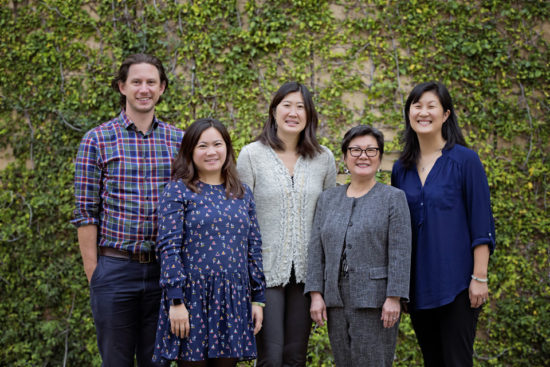
Photography by Christine Baker-Parrish
Create Change is designed and produced quarterly by the staff of the John and Terry Levin Center for Public Service and Public Interest Law. Unless specifically noted, all articles are written by staff:
Associate Dean for Public Service and Public Interest Law: Diane T. Chin
Executive Director: Anna Wang
Director, International Public Interest Initiatives: Titi Liu
Director, Pro Bono and Externship Programs: Mike Winn
Assistant Director: Jodie Carian
Research Assistant: Seimi Chu, BA ’19
To be notified when new issues of the newsletter are available, please visit this website.
Create Change is published via email and past issues are available on our website. Articles, letters, and photos are welcome. Please send them to public.interest@law.stanford.edu.
You can visit us on the web at:
law.stanford.edu/levin-center
www.facebook.com/levin-center


